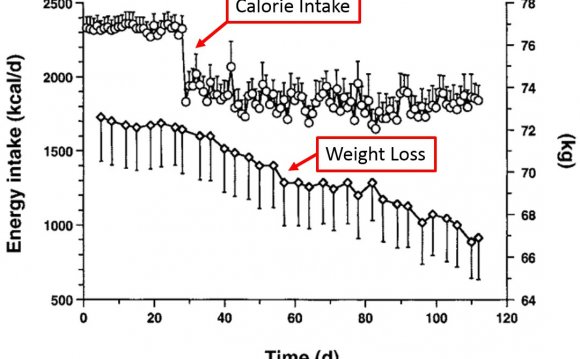
If you've been struggling to lose weight and keep it off, you're not alone. All the fad diets in the world won't change the fact that weight loss comes down to one basic equation.
Whether you lose or gain weight depends on how many calories you eat compared with how many calories you burn. If you eat more calories than you burn, you'll gain weight. If you burn more calories than you eat, you'll lose weight. There may be other minor factors that come into play but if you're serious about losing weight, then that's all you really need to know.
What might come as a bigger surprise is just how much exercise you have to do to burn off what might seem like a 'little treat'. Even though the odd pastry, glass of wine or small order of chips might not seem like much, you could be in for a shock when you add it up over the course of a week or a year.
Weight Loss and Nutrition
The number of calories that are burnt through exercise varies from one person to the next. Quite simply, everything you eat will either be converted into energy to fuel movement or fat that will be stored in your body. This is why nutrition is crucial to weight loss. You can work out all day every day, but if you still overeat and make poor food choices, you'll remain overweight. Exercise alone is not enough.
The reality is that food occupies a much larger part of our lives than exercise does. Therefore, the winning formula for successful weight loss is 80 percent nutrition and 20 percent exercise. To understand what constitutes good nutrition, you need to understand the difference between calorie-dense and nutrient-dense foods.
Nutrient-dense foods give you the most nutrients (vitamins, minerals, phytonutrients, essential fatty acids and fibre) for the fewest number of calories. These are whole foods, which are foods that are subjected to little or no processing and are eaten in a natural state, such as lean meat, poultry, fish, eggs, fresh fruit and vegetables, legumes, nuts, seeds and whole grains. Because they're lower in calories, we can eat more of them.
Calorie-dense foods - chips, ice-cream, burgers, hot dogs, pizza, cakes, pastries and sweets - are high in fat, sugar and/or salt, and are generally devoid of nutritional value. To lose weight, you need to minimise the amount of calorie-dense junk foods you eat and make low-calorie nutrient-dense foods your champions.
The first step is to stop making excuses for picking up takeaways instead of preparing your own meals because you're too busy, too stressed or too tired. Get rid of all the pre-packaged junk cluttering up your kitchen and restock your fridge, freezer and pantry with fresh, nutritious food. This will make it much easier to map out your meals and control your portions
Portion Sizes Matter
Pay attention to how much you're putting on your plate. Measure out your meal like this: a quarter of your plate should comprise lean protein (which should be no larger than palm-sized wide and pinkie deep), another quarter should be low-GI carbohydrates and the remaining half should be filled with vegetables or salad. Don't go back for seconds - you don't need them.
Here's another portion tip: when making a sandwich, add at least two salad or vegetable ingredients for each protein or spread. Bear in mind that avocado, which is rich in nutrients but dense in calories, counts as a spread.
Regular is Best
Remember to eat regularly, which means eating breakfast, lunch and dinner. Don't skip meals. It doesn't help you lose weight and will always come back to bite you in the form of energy loss or the temptation to binge.
You should also focus on eating more during the day, when you need it most, and less at night. Georgie Moore, 12WBT's accredited practising dietitian, recommends eating a smaller amount at dinner than you've had at lunch, as we generally need less energy in the evening, when most people are relaxing.
If you follow these nutritional tips, you'll be well on your way to your weight-loss goal, and it will be a lot easier to maintain once you reach it.
Weight Loss and Exercise
Generally, overweight people burn more calories than thinner people. The more out of shape you are, the harder your heart has to work - and the higher your heart rate, the more calories you'll burn. However, overweight people usually can't work out as hard as smaller, fitter people as they can't maintain a high intensity without frequent breaks. Don't let this stop you though. Do whatever you can to move more.
The first rule is to just get out there and do something. Aim for morning training - it's not only great to avoid being interrupted, but it's also better for weight loss. That's because, if you exercise before you've eaten, your body uses the energy it's stored overnight because there's no food in your stomach.
Go armed with a plan. If you're heading for the gym, make a pact with yourself that you won't leave until you've worked out for a minimum of 30 minutes, or your heart rate reaches 160, or you burn 500 calories. No matter what you do, aim to give each workout your best effort.
We highly recommend buying a heart rate monitor - it's an incredibly useful exercise tool that helps you understand the relationship between your heart rate, exercise and how many calories you're burning.
Mix it Up
Mix up your exercise routines. Combine aerobic exercise with resistance training (for example, do 10 star jumps and then drop for 10 pushups). Try interval training, where you train at 65 to 70 percent of your maximum heart rate but periodically ramp it up to about 85 percent for short bursts (for instance, jog for 30 seconds and then break into a sprint for 30 seconds). Factor in some weight training, but make sure to do it with sufficient speed and intensity to get your heart rate up or you won't get the weight-loss benefits.
INTERESTING VIDEO












